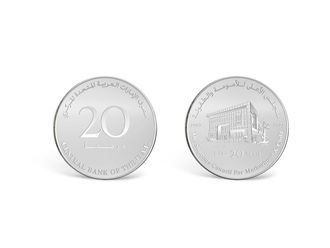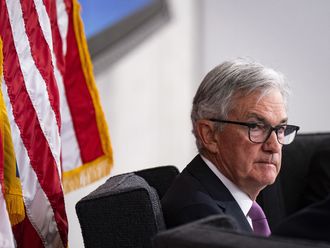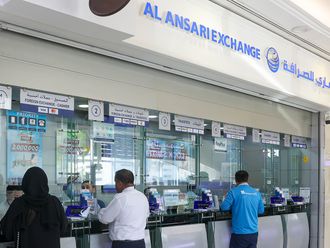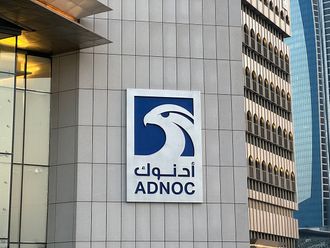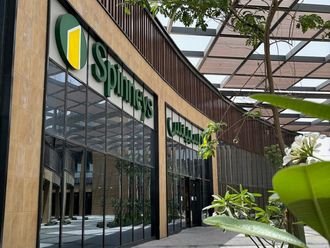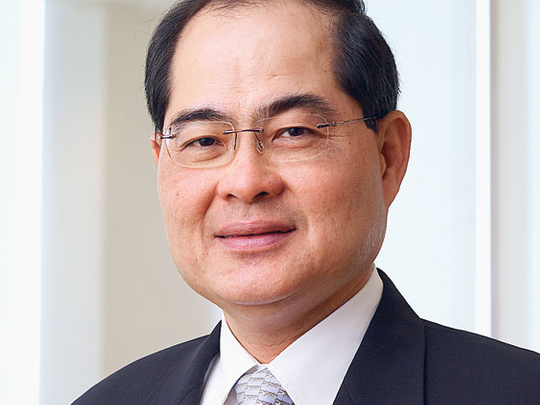
Singapore: Singapore Minister of Trade and Industry Lim Hng Kiang said his country's desire to offer Islamic finance comes as a natural extension to the financial services it is offering. The industry, he added, has the ability to take more players and more liquidity.
Lim was speaking to a group of journalists from the Middle East following the first annual World Islamic Banking Summit: Asia (WIBC: Asia), which was held in Singapore recently. It was the first meeting of its kind. Previous meetings were held in Bahrain over the last 16 years.
Following are excerpts of an interview with Lim.
Gulf News: What competitive advantages, you think, Singapore has in Islamic Finance?
Lim Hng Kiang: Well, we see ourselves as offering a range of facilities. First of all, financial services is very important part of our economy. It contributes around 11 per cent to 12 per cent of our GDP, and as we built up Singapore as a financial services centre, it is natural for us to extend this to Islamic finance as well, for several reasons….
One, we should offer the full (financial) services. We have very important clients who see this as an important offering. Therefore, I think, institutions here want to provide this service, and so does the regulatory authority. I think our job is to try to meet this level, and remove any disadvantages that may be in our regulatory or tax framework with regard to Islamic finance. So we don't set out with clear target that we want to establish ourselves as Islamic finance centre, or ask ourselves what we can do. Basically, we see this as an extension of our development as a financial services centre.
But at the same time, are you concerned about the competition from other Asian countries? Countries including Malaysia, Indonesia, China, Japan and Korea, are all competing in the same region that is the Gulf region?
Our assessment at this stage is that the market is still very under-developed, and we hope to build depth, diversity and liquidity, and so we feel there can be more players, more institutions, more centres. So we don't see this as a zero sum game. The market is growing. And in fact, there can be more players, more institutions, more products, more liquidity and this is good for all of us.
Do you think that the Singaporean banking system can leverage more on the wholesale market and the capital market rather than the retail market?
I think for the time being, this is a natural assessment, or natural thing to do. We are a very small population. The retail banking sector in Singapore is constrained, and Singapore's strength is really in the corporate treasury, in wholesale and off-shore. I think this is where our natural strengths are.
But, as we attract more institutions here, more players, and to extend our reach to retail investors in other jurisdictions. then of course, the retail base, or the retail coverage, or cash can grow. But for the time being, I think our main focus is in the wholesale sector.
Do you think there is a place for Islamic banks operating in Singapore to compete in the field of commercial banking activities? Is there a real demand for Islamic bank products on the corporate side and on the retail side?
I think we will leave this to the financial institutions. Historically, the conventional banking services in Singapore have developed over the period of time, and Islamic banking is a new player. But that doesn't stop the banks or the financial institutions from developing products and services that can compete with the conventional banking sector. In short, we will leave this to the players themselves, and we (as a regulatory authority) are always open to feedback if they feel they want to compete with the conventional banking sector and they don't find a level playing field on the regulatory front.
The Free Trade Agreement with the GCC was signed several years ago, and has been ratified by many GCC countries, and today, more countries still need to ratify it. Why this delay in your opinion?
Well they are trying as hard as possible. Basically the situation is that we signed it in December 2008, and we have to respect the process in the various GCC countries. So far, I understand, that four GCC countries have signed it, the latest being Bahrain. So only Kuwait and Saudi Arabia are left. We have been in contact with our counterparts in the two countries. They have a domestic process to follow and we understand that.
What are you expectation from WIBC-Asia?
Well, first of all, we have always respected Bahrain, and admire (its) ability to progress and to move the WIBC forward, and I think MAS (Monetary Authority of Singapore) has been in touch with them. We have an MOU and we are seeking ways to enhance our collaboration. One of the suggestions is that the WIBC be less centred on the Middle East.
If you can have a branch out in the Asian circuit, I think you are extending your reach, and this is very much in line with our philosophy at this stage. I think you need depth, you need more liquidity, and you need more players. As you mentioned there are new players in the Asian landscape, Indonesia, Malaysia, Korea, and elsewhere. Therefore, because Singapore has a very central role in Asia outside the Middle East, there, we could collaborate and extend the reach of WIBC. So we are very grateful to Bahrain for facilitating this development.
Every country in the Asian region or the Gulf region is taking certain steps or initiatives to support the development of the Islamic finance industry, whether on the banking side, or the insurance (Takaful) side. What are the initiatives taken by Singapore to really have its own fingerprint in this industry?
We are trying our best to understand the market. As I mentioned we are a new player and in touch with the institutional players to find out what we need to do.
So the first thing we did was to take a look at all our internal regulations and remove all the obstacles because of the special nature of Sharia-compliant products. So our first step was to try to resolve all that, so there is no disadvantage.
By and large, I think we have done this over the last two, three years. The second thing we did was in response to the financial institutions, especially the middle eastern banks that have branches here and they need to meet capital requirements. They want something that is again Sharia-compliant. There are not so many instruments, so MAS and the Singaporean government decided to put sovereign sukuk in Singaporean dollars, so they can subscribe to this. At the end, they have to be the market players, they must come up with new products, they must understand the market, know what the investors want and this is a two-way process. We continue our dialogue with them, and see how we can facilitate their growth and development.
Singapore is known as a financial centre in the region. Are you seeking to be a financial hub for Islamic banking?
I think we are not looking at a specific aspiration or ambition. I think basically, as I mentioned, we do have an ambition or an aspiration to be a vibrant financial services centre and we see Islamic finance as part of or an extension of that.
Today, Islamic finance constitutes maybe 5 per cent, in terms of assets, of global financial activities. We think it will grow, and as it grows, we also want it to be part of our growth and our offerings. So I don't think we set out to say we want to be among the top 3 or top 5 Islamic finance centres in the world.
I think basically, if we look at the growing opportunities in Asia, there are obviously opportunities for financial centres to develop. Few of us have done reasonably well during this phase, whether Hong Kong, Singapore, Tokyo or Shanghai.
I think to be a financial services centre in this region, you can't be so narrow and leave out Islamic finance, so we see this as giving a complete offering and that is how we see our role, and how we see the development going forward. It is very hard to replicate what is happening in the Middle East, because your base is already built and your development has occurred over a longer period.
How was the response to the first sovereign sukuk in Singapore, and is there any plan to issue it again?
I think, we have to structure it in such a way that it meets the requirements of the banks here. If they want to, they can subscribe and the pricing is on a demand basis. So far, I think we don't have a bigger demand, if there is a demand increase, I think we will expand our offerings accordingly. Our issuance is worth S$200 million (Dh529 million) and it is not fully taken up.
Singapore has been active in pushing forward the Asean-GCC bloc. How do you explain the lack, so far, of a solid development in this regard?
Sometimes, we need to be patient. First of all, this is happening on several fronts. I think there is a strong desire to have stronger collaboration between GCC and Asean. We are approaching it on several fronts.
One is the political front, and I think we have the Asean-Middle East dialogue. The Foreign Ministers recently held a meeting, and I believe they want to make this an annual event, alternating between GCC and Asean.
So it is a very positive development. Among the trade ministers, we also decided in Asean that we will approach the GCC as an Asean-GCC FTA (Free Trade Agreement). As you know Asean is a regional community have FTAs with many of our partner countries, with China, Japan, Korea, India, Australia and New Zealand. And we felt it is also important for us also to reach out to GCC, so we extended this to them, this process takes time……
On the trade side between Singapore and the Mena region, obviously you are an importer of oil. But what comes next? And what do Arabs want from Singapore?
Basically it is heavily weighted on oil, the other products we import form the Middle East (is) aluminium because it is related to energy. (There are) some agricultural products too. On our exports, I think we export whatever we produce here; electronic products (and) refined petrochemical products. The trade balance reflects what we typically produce here — in terms of pharmaceutical, electronics, oil rigs, shipping….
What are the challenges of Islamic finance facing Singapore?
One of the key challenges is talent. You want to develop people who understand the market and who can innovate and meet the needs of the clients and investors.
So you need to build up the training and the infrastructure for training the people in this very specialised field.
I think MAS has started market practitioner training courses. We have involved Singapore Management University to do this. But these things take time. We want to develop new generations of bankers and finance managers who understand the market and satisfy the clients. In terms of the facilitating financial institutions, I think we have done the groundwork and we expect them now to run with the ball.
Where do you see Islamic banking in Singapore in 5 years or 10 years?
I hope it will grow obviously. We are growing as an overall financial services centre. We are not New York, we don't have a continental economy like Shanghai. We struggle between onshore activities and offshore activities and therefore we need to find out what our range of capabilities is. Over the years, we have developed a fairly good complement of such activities, whether it is commercial banking, insurance, corporate treasury, offshore international activities, private banking and capital markets. Capital markets is a huge challenge because you don't have the economic base, but we are making fair progress.
For example, we have been building up the fund management sector in Singapore and in our last survey in 2008, assets under management in Singapore (reached) $610 million, and that started from a very low base ten years ago. If you see that development over the next five years — all this base that we are developing and the growing asset management sector and also private banking sector, I think Singapore will reach a certain position with those developments. And with that kind of perspective, we see Islamic banking as part of the offering and as an extension of what we are trying to do.
Would it be safe to say that Singapore managed to overcome all the implications of the financial crisis?
I think it is an ongoing saga. We are watching the developments in the European sovereign debt problem very closely because we don't think it has been completely resolved, I think it is still affecting the market.
Obviously Singapore is part of the global financial system, would be affected not directly, but indirectly. And I think they are still continuously suffering in terms of the responses of different regulatory bodies and I think all of us would have to live with the consequences of new regulations.
Some activities will go offshore because of changes in regulations. So I think we are still seeing the story unfolding.
Profile
Work history
Lim Hng Kiang is the Minister for Trade and Industry and Deputy Chairman of the Monetary Authority of Singapore.
After finishing high school in Singapore, Lim Hng Kiang, born in 1954, was awarded a scholarship to study Engineering at Cambridge University. Following his graduation in 1976, he spent several years in the Singapore Armed Forces. In 1985, he received another scholarship to pursue higher education in Public Administration at the Kennedy School in Harvard University.
After his return, he held senior posts at the Ministry of Defence and the Ministry of National Development. He was also appointed minister of health, trade and Industry. During the nineties, Kiang was also appointed second minister for foreign affairs and finance.
Currently, Kiang is Deputy Chairman of the Monetary Authority of Singapore and a Board Director of the Government of Singapore Investment Corporation.


